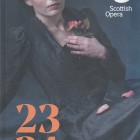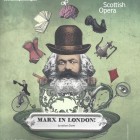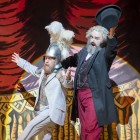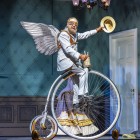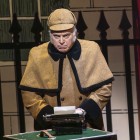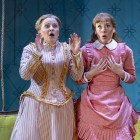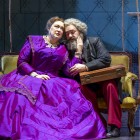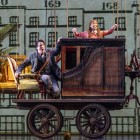Marx in London! 2024Scottish Opera
Read more about the opera Marx in London!
Jonathan Dove's latest comic opera was well received at its 2018 premiere in Bonn (not a million miles from Marx's birthplace in Trier). It was equally successful at its opening night in Glasgow, with many points which the audience found laugh-out-loud funny. The reception both at the interval and the close was hugely enthusiastic.
While there may be some elements of pathos, this work is definitely a comedy, centred on Marx's constant money worries. However, he is always rescued from these (today just in the nick of time) by his wealthy Manchester-based industrialist friend Engels. His other difficulties arise from his domestic life - his wife, his housekeeper, his daughter and her suitor.
Charles Hart has had a successful career as a lyricist, most notably for two classic Andrew Lloyd Webber works, Phantom of the Opera and Aspects of Love. Hart's libretto was full of excellent ideas, ranging from the profoundly serious (usually involving long-suffering wife Jenny), to the wittily ironic with lines worthy of Sondheim or Gilbert.
Stephen Barlow enjoyed a great success when he directed Dove's Flight for Scottish Opera in 2018. If anything his work here is even better, extremely sharp. The drama is carried forward through lots of short scenes requiring extremely quick changes. This all worked wonderfully thanks to the inspired designs of Yannis Thavoris, with video elements by PJ McEvoy - impressive ever-changing London streetscapes. The Marx drawing room starts fully furnished but becomes more spartan after the visit of the broker's men. All is restored at the end thanks to the Deus-ex-machina Engels, who arrives on a penny-farthing, with appropriate angels' wings sprouting from his shouders.
The music is delightful, with Dove's eclectic mix of styles much in evidence. The Marxist theme is sown at the start with reference to John Adams and Nixon in China. Sondheim and Stravinsky (Rake's Progress) are never far away, and the second act begins with a hilarious parody on Ligeti's motor horns. It is all beautifully orchestrated, and one feature not encountered in his previous, smaller-scale works, is his superb writing for the chorus.
The first act ends with Marx in the reading room of the British Library, unable to settle to work, and disturbing the serious scholars (more irony). Marx nods off and dreama of the Paris Commune of 1871 - his dreams coming true? - but is awoken by the Communards as their revolution falters. The choral writing is fiendishly difficult and he wakes to wickedly timed shouts by the surrounding throng. The opera's finale, as tranquillity is restored, has a second big choral number, all sweetness and light, with Marx basking on Hampstead Heath.
There is a long list of solo roles, with Roland Wood's superb Karl always at the centre, even when he is forced to make an undignified entry through his own parlour window. His always good-natured and cheerful angelic friend is beautifully delivered by Alasdair Elliott. The three female roles are of equal importance, with Orla Boylan making a notable long-overdue local debut as Jenny. The housekeeper is always in the picture as presented by Lucy Schaufer. Rebecca Bottone throws off her demanding coloratura flourishes with ease, and duets beautifully with William Morgan's cheerfully bewildered Freddy - their scene at the piano as it is removed on the bailiff's cart is a particular highlight.
Jamie MacDougall opened proceedings as the Prussian spy, frustrated at the apparent lack of revolutionary activity on the part of his quarry. Even before the start, it was of course the voice of the real MacDougall begging the audience to switch off mobiles, etc - the Prussian authoritarianism spreading even further. Another newcomer, tenor Paul Hopwood, made a great impression in the part of Melanzane, another revolutionary, dismissed by Marx, during their debate (fight), as a half-wit.
David Parry conducted the Bonn launching of Marx in London!, so knows the work well. He also conducted Dove's Pinocchio which Opera North brought to Edinburgh a few years ago, so is well acquainted with the composer's style. Parry drew the whole work together, with Scottish Opera's orchestra in superb form.
There are only five performances, which seems a pity, but this wonderful staging is quite good enough to be revived sooner rather than later.
Performance Cast
- Karl Marx an (in)famous German socialist philosopher, aged 53
- Jenny Marx Karl's wife of 28 years, aged 57
- Eleanor 'Tussi' Marx Karl and Jenny's youngest daughter, aged 16
- Freddy a young man looking for his family, aged 18
- Helene Demuth the Marx family's housekeeper, aged 51
- Friedrich Engels Karl's best friend, aged 51
- Spy
- Pawnbroker
- Melanzane a political theorist
- Franz a fellow socialist
- Chief Inspector Littlejohn
- Sergeant
- Foreman
